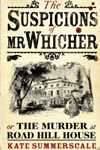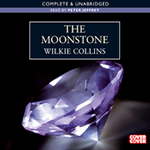« Bound to be (more) Beautiful | Main | Knitting and Stitchery Show 2010 »
Thursday September 30, 2010
Books in September
- The Suspicions of Mr Whicher: or the Murder at Road Hill House Kate Summerscale
 I can highly recommend this book as a fascinating read. Some other reviewers say that there was far too much detail based on the author's research and complain that it's not much of a mystery novel; my conclusion is that they were misled by the cover blurb which does the book an injustice if it implies it's in the detective fiction genre. I would class myself as a fairly lightweight reader who enjoys murder mysteries - and yet I was really gripped by this book, in the same way that I loved The Victorian House (Judith Flanders).
I can highly recommend this book as a fascinating read. Some other reviewers say that there was far too much detail based on the author's research and complain that it's not much of a mystery novel; my conclusion is that they were misled by the cover blurb which does the book an injustice if it implies it's in the detective fiction genre. I would class myself as a fairly lightweight reader who enjoys murder mysteries - and yet I was really gripped by this book, in the same way that I loved The Victorian House (Judith Flanders).
I really appreciated the frequent references, and also the absence of material where there is no historical information available. The picture of the early detective force in the 1850s seems to show their reliance on keen observation identifying somewhat naive criminals, and arrests of the form "come along quietly now lad" followed by immediate confession. Not to underrate their skill, but it makes an interesting contrast to today's methods of detection, where increased skill in producing hard evidence seems to have led to increasingly sophisticated criminals. It is very interesting to understand through writings of the day, how much social class influenced the role of the police - they had an odd status, having the power of the law behind them but no power at all in social standing - their need to pry into everything to uncover the truth was not considered right or decent. [In fact, I even noticed something similar in a contemporary TV episode of Midsomer Murders where on being asked whether the suspect had "stayed overnight" with the witness she replied stonily "how is that possibly any of your business?" - even though the question had a clear purpose.]
I find it hard to see how this book could be taken for a conventional murder mystery as such - the actual murder is really so horrid (as real-life murders always are) that it does not make for a good fiction story. It was the sensational news of the day akin to Ian Brady or Ian Huntley, and seems to have spawned the original police detective story. A number of authors of the day produced fictional stories, using the (then) police methods, but none reproducing anything like the actual Road Hill House murder.
The author cited The Moonstone frequently, showing how it very much followed the pattern of clues in the true story and how the detective (Cuff) was an amalgamation of Whicher and some of his fellow detectives at the time - so I thought I had better read it again to compare... - The Moonstone Wilkie Collins [Read by Peter Jeffrey]
 I say "read it again" but actually I am not sure I ever made it through the whole book before even though I have owned the book for a number of years. This time I listened to a spoken-word version - and it was great. The tale is told in sections by a number of different narrators; the story has a conversational style which changes according to the "writer" and therefore is well-suited to the spoken word, especially as Peter Jeffrey seems exceptionally adept in giving the characters voice. So I found it very digestible; in addition, there is a lot of tongue-in-cheek humour in the book, and I must say even though I think I take an interest in Victorian history, I was surprised by how much the humorous content felt quite contemporary. The story was originally written for serialisation in a magazine, so it is episodic in nature and somewhat "spun out" - and this also worked well as an audiobook.
I say "read it again" but actually I am not sure I ever made it through the whole book before even though I have owned the book for a number of years. This time I listened to a spoken-word version - and it was great. The tale is told in sections by a number of different narrators; the story has a conversational style which changes according to the "writer" and therefore is well-suited to the spoken word, especially as Peter Jeffrey seems exceptionally adept in giving the characters voice. So I found it very digestible; in addition, there is a lot of tongue-in-cheek humour in the book, and I must say even though I think I take an interest in Victorian history, I was surprised by how much the humorous content felt quite contemporary. The story was originally written for serialisation in a magazine, so it is episodic in nature and somewhat "spun out" - and this also worked well as an audiobook.
Given that the story is about a theft and not a murder, it is astonishingly similar to the Road Hill House crime, and is very obviously inspired by it. It follows the form: crime in a "posh" house, (erroneous) suspicion falling on a young lady, the key clue of the "missing nightgown" (stained with paint rather than blood), the character and fall from grace of Detective Cuff... and so on. Unlike the real world of course, it concludes with a satisfyingly happy ending.
[Sadly, no happy ending would ever have been possible for the real murder story.]
Posted by Christina at 10:11 AM. Category: Books of the Month
Comments
I really liked Mr Whitcher, read on your recommendation. I also suggest The Woman in White - I believe you still have my copy.
hahahahaha
Posted by: Alison on October 21, 2010 4:20 PM
